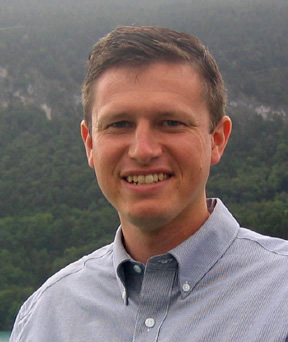
Steven Tait obtained a BS degree in Honors Physics and University Honors from Brigham Young University in 2000. He went on to graduate studies at the University of Washington, where his doctoral studies were co-supervised by Charlie Campbell in Chemistry and Sam Fain in Physics. A significant portion of his doctoral work was done in the laboratories of Bruce Kay at Pacific Northwest National Laboratory in eastern Washington State through a graduate fellowship program in Nanoscience co-sponsored by UW and PNNL. His doctoral work explored the desorption kinetics of small alkanes from solid surfaces, methane dissociation on Pd nanoparticles and the growth and sintering kinetics of Pd nanoparticles on aluminum oxide. He completed his PhD in 2005 and moved to Stuttgart, Germany for postdoctoral work in the department of Prof. Klaus Kern at the Max Planck Institute for Solid State Research. There he studied the self-organization of supramolecular nanometer-scale structures at surfaces, especially systems formed by metal-organic coordination. Those studies were sponsored by fellowship awards from the Alexander von Humboldt Foundation and the Max Planck Society.
Prof. Tait's current research focuses on functional nanometer-scale architectures at surfaces formed by self-assembly of organic building blocks. This research combines the understanding of growth kinetics and materials characterization of physical and analytical chemistry with the rich building block library and supramolecular organization schemes of organic and inorganic chemistry. Prof. Tait's research group utilizes a variety of surface analysis methods to develop and characterize these systems. Efficient patterning of solid surfaces with organic materials is a challenging research problem that has the potential to open up new opportunities and new technologies in many fields, including molecular electronics, catalysis, molecular recognition/sensors and magnetism.

